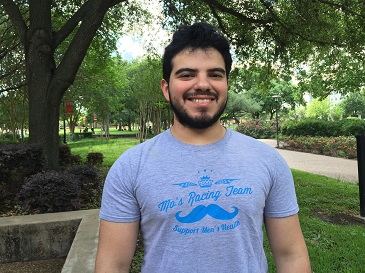
A University of Houston student set to graduate this spring has been awarded a graduate research fellowship from the National Science Foundation, propelling him toward a graduate degree in chemical engineering.
Ricardo Sosa received the 2016 National Science Foundation Graduate Research Fellowship, a competitive award open to undergraduate seniors and early graduate students pursuing a master’s or doctoral degree in the social sciences, STEM or STEM education fields.
Jeffrey Rimer, Ernest J. and Barbara M. Henley Associate Professor of Chemical and Biomolecular Engineering, hired Sosa to work in his lab while Sosa was just a freshman.
"It is not often that I accept students at the freshman level, but I made an exception for Ricardo,” Rimer said. “Having met him the year before he started at UH, I was impressed with his enthusiasm for research. During the past four years, his performance in my laboratory has been nothing short of outstanding.”
Sosa will enter graduate school to continue his studies in chemical engineering at UH in the fall, and the NSF fellowship will help to fund his work.
"Ricardo has demonstrated the ability to conduct graduate-level research, and his selection for this prestigious award is reflective of his hard work and productivity," Rimer said.
Two UH students were finalists for the award: Sophia Ewens, a senior biochemical and biophysical sciences major, and Kyle Karinshak, a chemical engineering graduate student. Tam Nguyen, a junior majoring in mechanical engineering, was a 2016 Barry M. Goldwater Scholarship Honorable Mention. The Goldwater Scholarship recognizes undergraduates for their research accomplishments.
Sosa submitted the winning proposal based on research he has done in Rimer’s lab.
The two first met when Sosa was a high school senior, taking a research class at KIPP Houston High School, and Rimer was a guest speaker. Like most high school students, Sosa didn’t really know what engineers did, but teachers steered him toward engineering because of his strength in math and science. When Rimer talked about working with kidney stones, a painful condition caused when small, hard mineral deposits form inside the kidneys, Sosa was intrigued.
They began an email correspondence, and after Sosa enrolled at UH with plans to major in biomedical engineering, Rimer sent a note about an undergraduate opening in his lab. Sosa jumped at the chance.
“It ended up hurting me with grades because I spent so much time there, but it turned out to be a great experience,” he said.
He soon changed his major to chemical engineering. The NSF fellowship covers educational costs and a stipend for three years over a five-year period. It does not require students to work only on the project submitted with their application, but Sosa said he expects to continue the work with kidney stones – studying how organic modifiers, like peptides and proteins, inhibit or promote the growth of kidney stones – at least for now.
He also has been a co-author on two scientific papers highlighting the research, which he said ultimately could lead to new treatments or a preventive treatment.
In addition to his undergraduate research, he has been active in promoting chemical engineering with local high school students, serving as co-chair of the UH chapter of the American Institute of Chemical Engineers outreach committee.